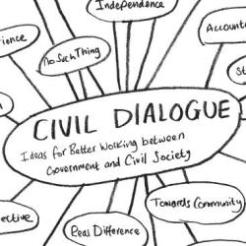Civil Exchange, a new think tank which will examine how civil society and the state can work better together, has officially launched with a series of think pieces from sector luminaries.
The publication, entitled Civil Dialogue, features contributions from the likes of Kevin Curley, chief executive of Navca; Lynne Berry CB, former chief executive of WRVS; David Harker CBE, former chief executive of Citizens Advice; Dame Mary Marsh, founding director of the Clore Social Leadership Programme; Sir Bert Massie CBE, former Commissioner for the Compact, and Julia Unwin CBE, chief executive of the Joseph Rowntree Foundation.
Proposals include more clarity of purpose on both sides, respect for independence, establishment of new funding and commissioning arrangements, sharing of experience and developments across the two sectors and creation of a new Compact.
An example of the clarity of purpose the think tank believes as necessary is stated as “does the government want small-scale community engagers and advocacy organisations or large-scale deliverers?”
On commissioning, the publication argues that government spending needs to move from acute to early action, and provide services that focus on outcomes and the whole person, not just individual symptoms.
New social contract
The Civil Exchange think tank has been founded by Caroline Slocock, former chief executive of Refugee and Migrant Justice and the Equal Opportunities Commission.
She is joined in the think tank by three associates. They are Berry and Harker along with Daniel Harris, managing director of the non-profit-focused agency DHA Communications.
Slocock said many of the contributors believe now could be a pivotal moment in forging a “new social contract” between government and civil society.
“Some of the changes need government action, for example, greater clarity about the purpose of the Big Society and new commissioning and funding arrangements.
“But other changes fall to civil society itself, particularly the call for charitable trusts to help set up new networks and alliances to make it easier to work with government to address cross-cutting social issues. Joint development of leaders would also be a positive step.”









